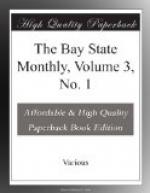With the fall of Richmond, and the surrender of Appomattox, Mr. Coffin’s occupation as an army correspondent ended. During these long years he found time to write three volumes for juveniles—“Days and Nights on the Battle Field,” “Following the Flag,” and “Winning his Way.”
On July 25, 1866, Mr. Coffin sailed from New York for Europe, accompanied by Mrs. Coffin, as correspondent of the Boston Journal. War had broken out between Austria on the one side and Italy and Germany on the other. It was of short duration; there was the battle of Custozza in Italy and Konnigratz in Germany, followed by the retirement of Austria from Italy, and the ascendency of Bismarck over Baron Von Beust in the diplomacy of Europe. It was a favorable period for a correspondent and Mr. Coffin’s letters were regularly looked for by the public. The agitation for the extension of the franchise was beginning in England. Bearing personal letters from Senator Sumner, Chief Justice Chase, General Grant, and other public men, the correspondent had no difficulty in making the accquaintance of the men prominent in the management of affairs on the other side of the water. Through the courtesy of John Bright, who at once extended to Mr. Coffin every hospitality, he occupied a chair in the speaker’s gallery of the House of Commons on the grand field night when Disraelli, then Prime Minister, brought in the suffrage bill. While in Great Britain Mr. Coffin made the acquaintance not only of men in public life, but many of the scientists,—Huxley, Tyndal, Lyell, Sir William Thompson. At the social Science Congress held in Belfast, Ireland, presided over by Lord Dufferin, he gave an address upon American Common Schools which was warmly commended by the London Times.
An introduction to the literary clubs of London gave him an opportunity to make the acquaintance of the literary guild. He was present at the dinner given to Charles Dickens before the departure of that author to the United States, at which nearly every notable author was a guest.
Hastening to Italy, he had the good fortune to see the Austrians take their departure from Verona and Venice and the Italians assume possession of those cities. Upon the entrance of Victor Emanuel to Venice he enjoyed exceptional facilities for witnessing the festivities.
He was present at the coronation of the Emperor and Empress of Austria, as King and Queen of Hungary. Through the courtesy of Mr. Motley, then Minister to Austria, he received from the Prime Minister of the empire every facility for witnessing the ceremonies.
At Pesth he made the acquaintance of Francis Deak, the celebrated statesman—the John Bright of Hungary; also, of Arminius Vambrey, the celebrated Oriental traveller.
At Berlin he had the good fortune to see the Emperor William, the Crown Prince, Bismarck, Van Moltke, the former and the present Czar of Russia, and Gortschakoff, the great diplomatist of Russia, in one group. The letters written from Europe were upon the great events of the hour, together with graphic descriptions of the life of the common people.




